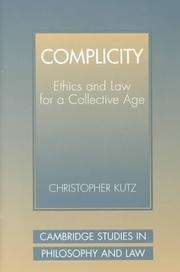| Listing 1 - 10 of 52 | << page >> |
Sort by
|
Book
ISBN: 3428051343 Year: 1982 Publisher: Berlin Duncker und Humblot
Abstract | Keywords | Export | Availability | Bookmark
 Loading...
Loading...Choose an application
- Reference Manager
- EndNote
- RefWorks (Direct export to RefWorks)
Guilt (Law) --- Law --- Philosophy
Book
ISBN: 9516481469 Year: 1975 Publisher: Åbo Åbo akademi
Abstract | Keywords | Export | Availability | Bookmark
 Loading...
Loading...Choose an application
- Reference Manager
- EndNote
- RefWorks (Direct export to RefWorks)
Damages --- Guilt (Law) --- Liability (Law)
Book
ISBN: 9789089741844 Year: 2009 Publisher: Den Haag Boom juridische uitgevers
Abstract | Keywords | Export | Availability | Bookmark
 Loading...
Loading...Choose an application
- Reference Manager
- EndNote
- RefWorks (Direct export to RefWorks)

ISBN: 3166446710 Year: 1983 Publisher: Tübingen Mohr Siebeck
Abstract | Keywords | Export | Availability | Bookmark
 Loading...
Loading...Choose an application
- Reference Manager
- EndNote
- RefWorks (Direct export to RefWorks)
Criminal liability --- Guilt (Law) --- Congresses --- Congresses
Book
ISBN: 9060005562 9789060005569 Year: 1988 Publisher: Arnhem : Gouda Quint,
Abstract | Keywords | Export | Availability | Bookmark
 Loading...
Loading...Choose an application
- Reference Manager
- EndNote
- RefWorks (Direct export to RefWorks)
Guilt (Law) --- Criminal law --- Criminal liability --- Droit pénal

ISBN: 8323003505 Year: 1991 Publisher: Warszawa Wydawnictwa uniwersytetu Warszawskiego
Abstract | Keywords | Export | Availability | Bookmark
 Loading...
Loading...Choose an application
- Reference Manager
- EndNote
- RefWorks (Direct export to RefWorks)
Guilt (Law) --- -Criminal law --- Criminal liability --- Psychological aspects --- Psychological aspects. --- -Psychological aspects --- Criminal law
Book
ISBN: 0190604700 0190604719 0190604697 Year: 2016 Publisher: New York, NY : Oxford University Press,
Abstract | Keywords | Export | Availability | Bookmark
 Loading...
Loading...Choose an application
- Reference Manager
- EndNote
- RefWorks (Direct export to RefWorks)
This book argues that ignorance of law should usually be a complete excuse from criminal liability. It defends this conclusion by invoking two presumptions: first, the content of criminal law should conform to morality; second, mistakes of fact and mistakes of law should be treated symmetrically. The author grounds his position in an underlying theory of moral and criminal responsibility according to which blameworthiness consists in a defective response to the moral reasons one has.
Ignorance (Law) --- Philosophy. --- Criminal liability --- Good faith (Law) --- Guilt (Law) --- Mistake (Law)

ISBN: 0521594529 0521039703 0511663757 Year: 2000 Publisher: Cambridge : Cambridge University Press,
Abstract | Keywords | Export | Availability | Bookmark
 Loading...
Loading...Choose an application
- Reference Manager
- EndNote
- RefWorks (Direct export to RefWorks)
We live in a morally flawed world. Our lives are complicated by what other people do, and by the harms that flow from our social, economic and political institutions. Our relations as individuals to these collective harms constitute the domain of complicity. This book examines the relationship between collective responsibility and individual guilt. It presents a rigorous philosophical account of the nature of our relations to the social groups in which we participate, and uses that account in a discussion of contemporary moral theory. Christopher Kutz shows that the two prevailing theories of moral philosophy, Kantianism and consequentialism, both have difficulties resolving problems of complicity. He then argues for a richer theory of accountability in which any real understanding of collective action not only allows but demands individual responsibility.
Collectivism. --- Guilt (Law) --- Law and ethics. --- Responsibility. --- Guilt (Law). --- Collectivism --- Law and ethics --- Responsibility --- Accountability --- Moral responsibility --- Obligation --- Ethics --- Supererogation --- Ethics and law --- Law and morals --- Morals and law --- Law --- Criminal law --- Criminal liability --- Totalitarianism --- Philosophy --- Arts and Humanities
Book
ISBN: 0190924357 0190924330 Year: 2020 Publisher: New York, NY : Oxford University Press,
Abstract | Keywords | Export | Availability | Bookmark
 Loading...
Loading...Choose an application
- Reference Manager
- EndNote
- RefWorks (Direct export to RefWorks)
'You can't be convicted of a crime without a guilty act and a guilty mind.' A lawyer might express the same idea using Latin: 'You can't be convicted of a crime without actus reus and mens rea.' 'Guilty Acts, Guilty Minds' proposes an interpretation of mens rea and actus reus as limits on the authority of a democratic state to ascribe guilt through positive law to those accused of crime.
Criminal intent --- Criminal justice, Administration of --- Philosophy. --- Dolus (Criminal law) --- Intent, Criminal --- Mens rea --- Guilt (Law) --- Law and legislation
Book
ISBN: 0191823287 Year: 2016 Publisher: Oxford : Oxford University Press,
Abstract | Keywords | Export | Availability | Bookmark
 Loading...
Loading...Choose an application
- Reference Manager
- EndNote
- RefWorks (Direct export to RefWorks)
Through a combined philosophical, historical, and socio-legal methodology, this volume investigates the changing nature of criminal responsibility in English law from the mid-18th Century to the early 21st Century, arguing that ideas of character responsibility are enjoying a renaissance in the modern criminal law.
Criminal liability --- Criminal intent --- Law - Great Britain --- Law - Non-U.S. --- Law, Politics & Government --- Dolus (Criminal law) --- Intent, Criminal --- Mens rea --- Guilt (Law) --- Law and legislation
| Listing 1 - 10 of 52 | << page >> |
Sort by
|

 Search
Search Feedback
Feedback About UniCat
About UniCat  Help
Help News
News